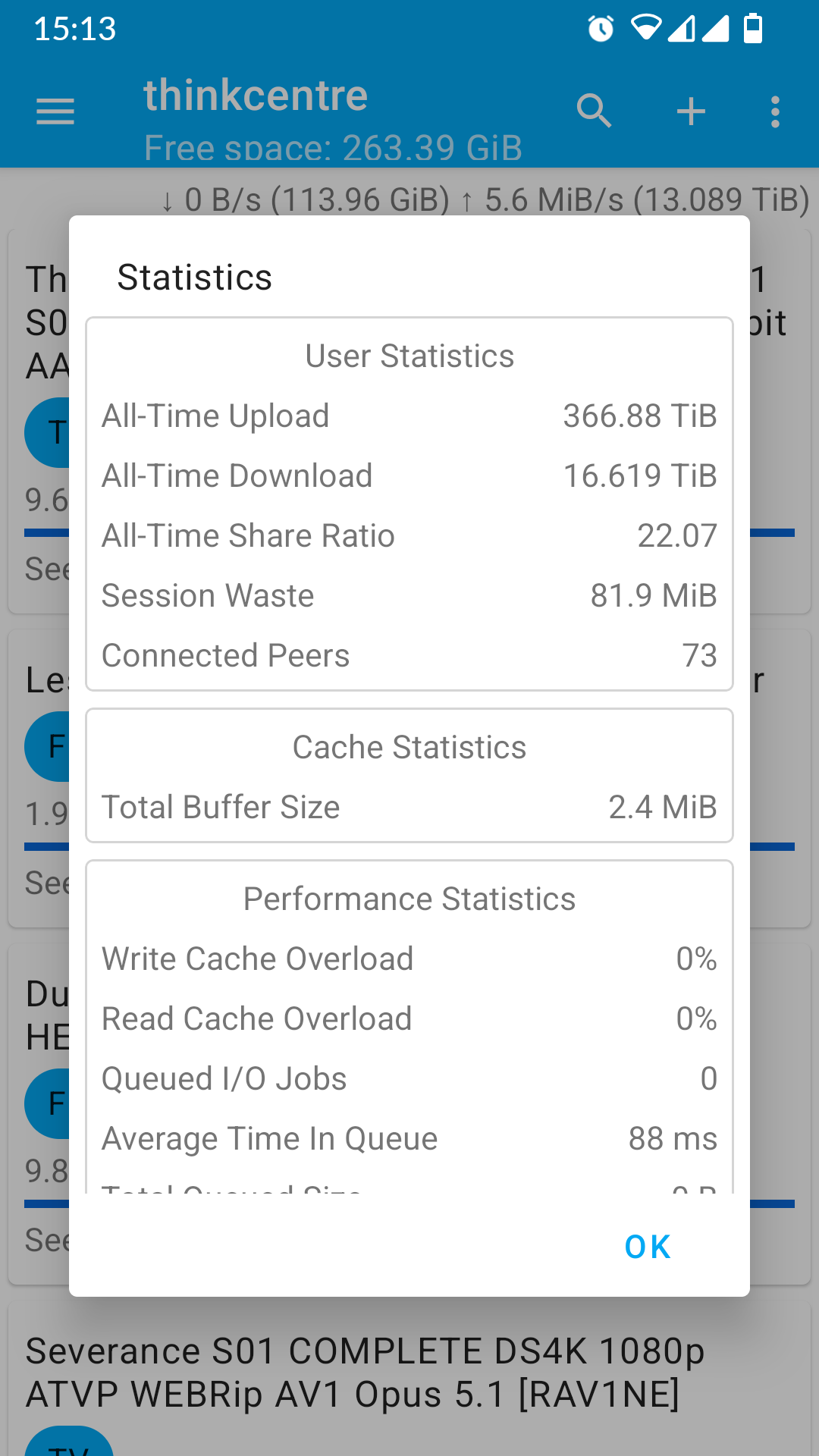

Or lock me out when I just had an accident in the yard
celles-ci sont pipes.sh


Or lock me out when I just had an accident in the yard


I don’t use a VPN but still had to assign a port interval or something to Soulseek from the router; other software maybe picks a more sensible (lower) port number?


Oh another tip, I have set it to always create subdirectories even if it’s single files in the torrent. Makes it easier to browse the main folder alphabetically later!


Other than linking in the filesystem as Grippler said (took me a while to understand soft and hard links on linux but they’re soo useful); you can create categories with a default location (e.g. /qbt/-TV, /qbt/-Films), so you only need to pick a category when adding a torrent, and “Automatic Management mode” should save it to the right folder automagically. Also if you don’t like the names you can rename both items in the torrent list and/or their corresponding foldernames and filenames, I do all this from qbittorrent (probably doable with other software as well).


You gotta pump those numbers up 🤓 holy sheet 16TiB is actually more dl than I remembered…this is from a 2TB ssd :) in a couple of years



Most people give their real full name, phone number and email for any loyalty card wothout batting an eye, plus even with anonymized data it’s useful to the owners to track correlation of purchases, time, location. Definitively what you said too, we all make mistakes (some more than others), every needless complication of a system is a disadvantage to the customer.


Just needed to remake a Z-lib account recently (without an account you can read but not download I think), and an alias from simplelogin worked. With temp-mail services I wasnt getting the confirmation email. And I ain’t gonna use my domain for pirating, sorry :)


There are free services that allow you to create countless emails, one per site is ideal, just like one (different) password per site. Addy and Simplelogin have a generous free tier, last I checked the first one allows for unlimited receive-only addresses (when shopping it’s very rare you need to respond), the second gives you some two-way addresses.
If you get a domain, many registrars include free mail service, and have mail forwarding, or “redirecting”, which basically will allow you to create countless addresses (that can also send/respond) for your one account (You add these “email forwards”, or “Identities”, to your app of choice, like K9-Mail for android). You don’t necessarily need to buy their separate email package (although the interface might be more convenient). I’ll give you one example which includes email: OVHcloud, one of the largest clouds in europe.
If you can afford it there are all-in-one services like Soverin with easier interface.
It might be wise to start a slow process of migrating (or maybe deleting and creating again) accounts, and saving all this stuff in a password manager (like KeepassXC) if you aren’t already.


Yep. Loads of unorganized (and some organized) files uploaded over decades via FTP 😅 a mess full of gems


Apparently the issues are mostly with the outgoing download links from libgen.rs and .st (passing through libgen.lol), including the IPFS links which were being problematic in the past few months already.
Instead I just tried something from libgen.gs which is the one for comicbooks, and it’s downloading fine from the direct link.
Thankfully most if not all content should be backed up on Annas-archive!


There are many encodes floating around and even a full bluray copy (criterion collection) on ygg.re… but I’m curious, how come it’s at the top of your list?
I would disable Network Access at least, if you’ve never done it go to App Info (holding the app’s icon) -> Mobile Data Usage -> Allow Network Access (at least it’s there now in A14 / LOS 21, could be slightly different in other versions)

Oh I was totally not up to date lol, thank you. Love me some fantasy illustrations, I might check it out

Oh interesting, thank you!

Hold on which book? I thought it was a new story. I read the first 4 books of ASOIAF a long time ago but never got to A Dance with Dragons, is it in there?


Oh sorry, can’t think of an easy solution then. I’ve seen that audiobookshelf can find metadata for you, that could be doable. They also support ebooks but if I understood correctly from their docs they don’t get synced to the audio position, just to themselves.
A promising but still in beta software is Storyteller, under very active development here. It works by creating a ‘rich’ epub that contains the audio synced line by line, which you can then read/listen to with just one app.
There’s also older software with a similar approach like syncabook but at a glance it seems less usable than Storyteller.


HDD usually don’t have a limited number of writes like SSD do, if they are robust, maybe enterprise units, they can last a long time.
In a home environment some prefer using slower (5400 vs 7200), non-enterprise hard drives, maybe fewer drives with higher capacity, to reduce noise, power consumption and improve cooling (in enterprise settings this stuff is standardized and they don’t care about noise, in my custom pc I might have forgotten to use the vibration dampeners or I mounted the disks vertically…every white box is different).
Also there are big differences between different models and makers. If they’re cheap enough those helium filled enterprise drives can be one of the best options!


Those big files like .m4b (b stands for book) should have chapters within it, if you open them with mpv on your pc you should be able to see them on the time bar. On Android I’ve been using Voice, it’s really well polished and shows a big chapter name so I usually remember where I was if I switch devices, even if not to the exact minute.
I figured out how to encode to a single m4b in fre:ac so I only use Voice now (or my ipod, which was the reason why I learned how to use fre:ac).
I know you asked for syncing (one day I’ll try adding the audiobook plugin to my jellyfin), but this works for me.
If you prefer a folder of files, you can use fre:ac or many other encoders/tools to split them up.


Hi there, it looks like Journeys is considered the 23rd season of Pokemon (wikipedia says so too), I found it on TMDB: https://www.themoviedb.org/tv/60572/season/23
They are usually separate things. Cookies are produced/saved locally, to be read in the next visit (by the same website or maany websites basically forever unless you use firefox containers or at least clear them once in a while). There’s also local storage which is different but can also be used to identify you across the web. Ads, trackers, all of these categories are often made of many small components: you read a single article on a “modern” newspaper website, hundreds of connection are being made, different tiny scripts or icons or images are being downloaded (usually from different subdomains for different purposes but there’s no hard rule). It’s possible to block one thing and not another. For example I can block Google Analytics (googletagmanager) which is a tracker, but accept all of Google’s cookies.